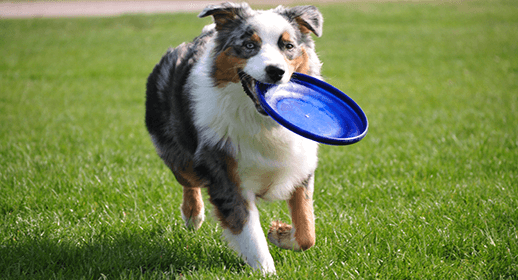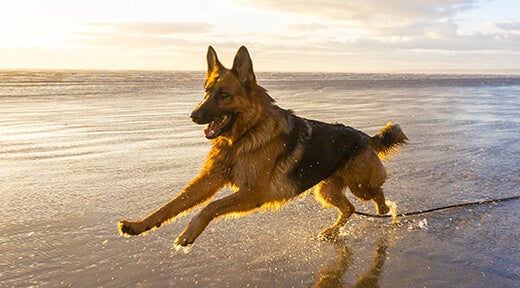

Obesity in dogs is a more common problem than you might think. Between 25% and 40% of dogs are overweight, but often, owners don’t realize it until they take their dog to the veterinarian for another reason. Yet even vets can’t tell if a dog is obese by their weight alone. Ideal weight varies by breed, and quite widely within breeds.(Did you know, for instance, that Labrador retrievers, dachshunds and beagles areall prone to obesity?) In short, there’s no ideal healthy weight chart for all dogs!
The good news is that if your dog is overweight, there are a number of ways to help them reach a healthy weight. Don’t underestimate the power of daily walks and a weight management dog diet — IAMS™ Adult Healthy Weight can help return your dog to a healthy weight, providing a path to help keep them fit for life.

Can you feel individual ribs easily? Is your dog’s abdomen slightly tucked up whenviewed from the side? That’s a sign your dog is at their ideal weight.
If you can't feel the ribs easily, your dog has no waist and their abdomen drags,your pup is carrying extra weight. Your veterinarian can help you further evaluateyour dog’s condition and determine their ideal weight.
Dogs gain weight for the same reason people do: They eat more calories than theyuse. Today’s dogs share another problem with their human parents: lack of activity.Many pet parents work all day and are too tired to play with their dog afterward.
Dogs’ metabolisms might slow as they age or after they’re spayed or neutered,which means they require less food. Another common reason for weight gain isfrequently eating high-calorie treats. Sometimes more than one family member isfeeding the dog, and the dog sure isn’t telling!
Other factors that could contribute to canine obesity include:
If you suspect that your dog is overweight or obese, the !rst step is to set up anappointment with your veterinarian so they can evaluate their condition. Likewise,before beginning any weight loss program with your dog, make sure to discuss itwith your vet.
If your dog is overweight, it’s time to implement a weight-management regimen. Ifyou usually feed one large meal a day or keep food available at all times, try adifferent dog-feeding schedule by dividing the daily ration into several small meals— at least two meals a day. It takes energy to digest food, and dividing your dog’sdaily ration into separate feedings will help. If your dog leaves any food in theirbowl, pick it up 30 minutes after each meal.

Your goal is to help your dog be healthier, so select their food carefully. Payattention to the ratio of fat, !ber, protein, carbohydrates and special ingredients inyour dog’s weight-management food:
After your dog reaches their ideal weight, select a maintenance food to keep theirweight steady.

Losing weight isn’t easy. Changing habits is the key. Here are some ways you can
help keep your dog on track:
A total weight-management program can lead to successful weight loss inoverweight or obese dogs. Remember: Your support is essential to your dog’sweight-control success.


German Shepherd Dogs are one of the most loved breeds in the world! They're incredibly smart, versatile and learn new behaviors quickly. If that wasn't enough, they're also faithful companions that are very protective of their families.
But before you take the leap and adopt a German Shepherd, there are a few things you must know about looking after one. As is the case with raising a dog of any breed, caring for a German Shepherd needs commitment, patience and understanding.
a. Exercising German Shepherds
German Shepherds are fantastic creatures in every sense, and it is easy to see why. GSDs are naturally energetic and need dedicated time daily to burn it off. They need at least 60minutes of daily physical exercise such as running and playing fetch in a park. A fit dog is a happy dog and one that is exercised regularly will not be happy, but healthy too.
b. Grooming German Shepherds
Be prepared to keep your vacuum cleaner handy. GSDs have thick coats, making them prone to shedding. Grooming your GSD takes time as well. You will need to give your pet a comb down at least 3 times a week. But you won’t need to bathe your dog too often (unless advised to do so by your vet).
c. Dog Food for German Shepherds
To stay healthy and active, German Shepherds require complete and balanced meals that are tailor-made to meet their unique needs. You could try a premium recipe like IAMS™ Proactive Health™ for Adult German Shepherds, which is specially formulated food for German Shepherds. This recipe is a blend of beet pulp and prebiotics (FOS) that supports healthy digestion, calcium, magnesium and other minerals and vitamins to support a healthy heart, and Omega 6 and 3 fatty acids to support skin and coat health. We recommend dividing their daily intake into two meals.
|
SIZE OF GERMAN SHEPHERD |
RECOMMENDED DAILY FEEDING (g) |
| 20-30 kg | 245-330 |
| 30-40 kg | 330-410 |
| 40-50 kg | 410-485 |
| 50-60 kg | 485-555 |
d. Diseases German Shepherds are Susceptible to
Like most dog breeds, German Shepherds are prone to diseases as well. But here are a few common diseases they are known to suffer from. Hip and elbow dysplasia, allergies, degenerative myelopathy, inherited eye diseases, exocrine pancreatic insufficiency, skin and heart disease, and thyroid disease. If you remain dedicated to providing your dog with the right kind of nutrition along with proper exercise, you should be able to keep illness at bay.
German Shepherds are a special breed. They have high energy, are strong and have oodles of stamina. But they also need a lot of attention and activity. If you are away from home frequently or dont have the time to spend exercising or grooming them, then a German Shepherd isn't the right choice for you. So are you ready to start caring for a German Shepherd? Ask yourself these questions before making a decision:
Do I have the time and energy to train my German Shepherd?
Do I have enough space in my home for such a large dog to flourish?
Am I financially stable to care for my GSD if any health issues arise?
If you answer yes to these questions, then you are ready to enjoy an action-packed life with
your furry new friend!
